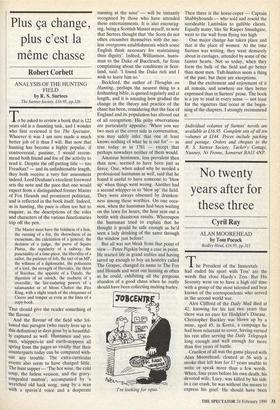Plus ca change, plus c'est la meme chasse
Robert Corbett
ANALYSIS OF THE HUNTING FIELD by R. S. Surtees The Surtees Society, 06.95, pp.326 To be asked to review a book that is 122 years old is a daunting task, and I wonder who first reviewed it for The Spectator. Whoever it was I am sure made a much better job of it than I will. But now that hunting has become a highly popular, if controversial, pastime, I would recom- mend both friend and foe of the activity to read it. Despite the off-putting title — too Freudian? — and its unfashionable length, they both receive a very fair assessment indeed. Lord Denham's excellent foreword sets the note and the pace that one would expect from a distinguished former Master of Fox Hounds and prominent politician, and is reflected in the book itself. Indeed, as in hunting, the pace is often too hot to enquire, as the descriptions of the roles and characters of the various functionaries trip off the pen.
The Master must have the boldness of a lion, the cunning of a fox, the shrewdness of an exciseman, the calculation of a general, the decision of a judge, the purse of Squire Plutus, the regularity of a railway, the punctuality of a time-piece, the liberality of a sailor, the patience of Job, the tact of an MP, the wiliness of a diplomatist, the politeness of a lord, the strength of Hercules, the thirst of Bacchus, the appetite of a Dando, the digestion of an ostrich, the coolness of a crocodile, the fire-enduring powers of a salamander or of Mons. Chabot the Fire King, with a slight touch of the eloquence of Cicero and temper as even as the lines of a copy-book.
That should give the reader something of the flavour.
And the flavour of the field who fol- lowed this paragon (who rarely lives up to this definition) in days gone by is beautiful- ly captured as well. Huntsmen and yeo- men, whippers-in and earth-stoppers all spring from the pages so vividly that their counterparts today can be compared with- out any trouble. The extra-curricular events also seem to have changed little. The hunt supper — 'The hot wine, the cold soup, the fatless venison, and the gravy- congealed mutton', accompanied by 'a wretched old hack song, sung by a man With a spavin'd voice and a desperate running at the nose' — will be instantly recognised by those who have attended these entertainments. It is also encourag- ing, being a Scottish Master myself, to note that Surtees thought that 'the Scots do not often encumber themselves with the use- less overgrown establishments which some English think necessary for maintaining their dignity'. Indeed, Williamson, hunts- man to the Duke of Buccleuch, far from complaining about the conditions in Scot- land, said: 'I found the Duke rich and I wish to leave him so.'
Beckford, the author of Thoughts on Hunting, perhaps the nearest thing to a• foxhunting bible, is quoted regularly and at length, and it is amazing how gradual the change in the theory and practice of the chase has been, considering that the face of England and its population has altered out of all recognition. His pithy observations are particularly apposite: 'When you see two men at the cover side in conversation, you may safely infer that one at least knows nothing of what he is out for' — as true today as in 1781 — except that perhaps nowadays neither of them would.
Amateur huntsmen, less prevalent then than now, seemed to have been just as fierce. One,, when asked why he needed a professional huntsman as well, said that he found it useful to have someone to 'blow up' when things went wrong. Another had a second whipper-in to 'blow up' the field. They were always obsessed by drunken- ness among these worthies. On one occa- sion, when the huntsman had been waiting on the lawn for hours, the host sent out a bottle with disastrous results. Whereupon the huntsman tried to explain that he thought it would be safe enough as he'd seen a lady drinking of the same through the window just before!
But all was not bleak from that point of view — Peter Pigskin being a case in point He started life in grand stables and having saved up enough to buy an hostelry called The Grapes, changed its name to The Fox and Hounds and went out hunting as often as he could, exhibiting all the gorgeous abandon of a good chase when he really should have been collecting malting barley.
'I'm looking for opus.' Then there is the horse-coper — Captain Shabbyhounds — who sold and resold the unrideable Lambskin to gullible clients. Equally many, like Sir Rasper Smashgate, went to the wall from flying too high.
One major change has taken place and that is the place of women. At the time Surtees was writing, they went demurely about in carriages, attended by some of the fainter hearts. Not so today, when they form the bulk of the field and go better than most men. Tuft-hunters seem a thing of the past, but there are exceptions.
But the excitement and enjoyment of it all remain, and nowhere are they better expressed than in Surtees' prose. The book is a joy to read in every sense — not least for the vignettes that occur at the begin- ning of the chapters. I strongly recommend it.


















































 Previous page
Previous page